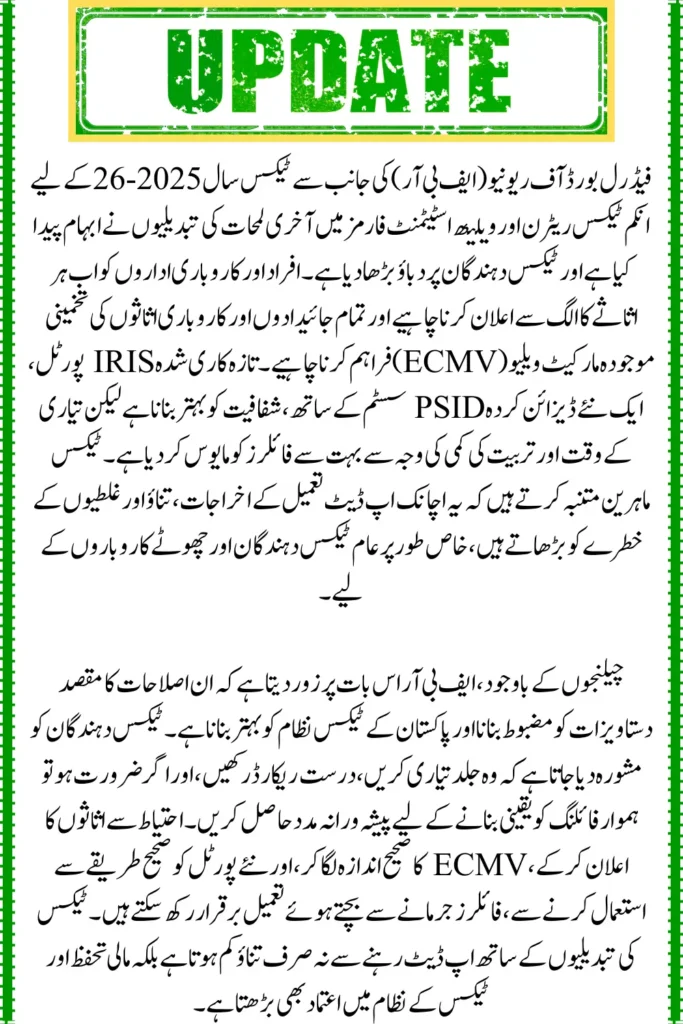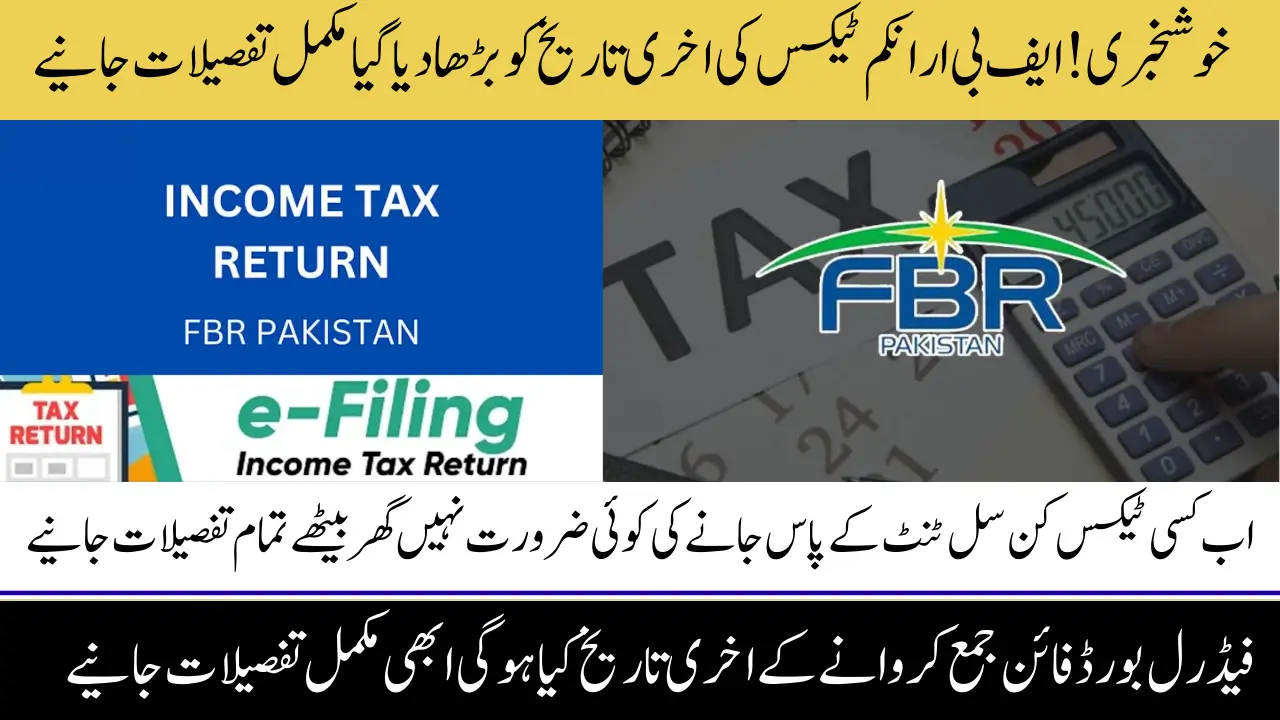FBR’s Last-Minute Income Tax Return Changes
The FBR has faced strong criticism for making last-minute changes to the Income Tax Return and Wealth Statement forms for Tax Year 2025–26. Taxpayers must now declare every asset individually and provide the Estimated Current Market Value (ECMV) of all properties and business assets. The updated portal also features a new PSID and calculation interface. While modern in design, these updates have confused filers who had already prepared returns under the old format.

Tax experts say sudden changes so close to the deadline create stress and increase errors. Ordinary taxpayers and small business owners now face extra time and costs to comply. Stakeholders demand that FBR roll out such reforms earlier, giving people time to adjust. Although the goal is to improve transparency and widen the documentation net, the timing has made the process frustrating for many filers.
You Can Also Read: BISP Campsite Closed in October, Latest Updates and Visitor Guidelines
Key Tax Changes Announced by FBR
The FBR has announced key tax changes for Tax Year 2025–26, just days before the filing deadline. Taxpayers now face new requirements in the Income Tax Return and Wealth Statement forms, making compliance more detailed and time-sensitive.
- Declare every asset individually in the Wealth Statement.
- Provide the Estimated Current Market Value (ECMV) of all assets.
- Add separate entries for property and business assets.
- Use updated PSID and tax calculation interface.
FBR’s last-minute updates aim to improve transparency but have added pressure on taxpayers.
You Can Also Read: BISP Campsite Closed in October, Latest Updates and Visitor Guidelines
How These Changes Affect Taxpayers
The last-minute changes introduced by the Federal Board of Revenue FBR have made tax filing more complex for ordinary taxpayers and small businesses. People must now declare every asset separately and provide its Estimated Current Market Value (ECMV). Many who had already prepared their returns using the old format are facing stress, extra costs, and the risk of making mistakes.
- Increases filing time and effort.
- Creates confusion due to sudden system updates.
- Raises compliance costs for individuals and small firms.
- Adds pressure close to the deadline, leading to errors.
- Reduces trust in FBR due to poor timing.
These changes may improve documentation, but they make the tax process harder for ordinary filers.
You Can Also Read: NADRA Face Recognition for Seniors, Fast, Secure, and Life-Saving Benefits
Common Mistakes Taxpayers Should Avoid
Many taxpayers face problems when filing returns due to small but costly mistakes. With the new FBR rules for Tax Year 2025–26, avoiding errors is more important than ever. Careless filing can lead to penalties, notices, or delays in processing.
- Not declaring all assets individually in the Wealth Statement.
- Forgetting to enter the Estimated Current Market Value (ECMV) of assets.
- Mixing business assets with personal property.
- Entering wrong details in the updated PSID system.
- Submitting returns at the last minute without checking for errors.
- Ignoring professional help when unsure about the new format.
Double-checking details and filing early helps taxpayers avoid errors and penalties.
You Can Also Read: CM Punjab T Cash Card, Complete Guide for 2025 Advantages and Enrollment Process
Step-by-Step Guide to Filing Your Return Under New Rules
Filing your income tax return under the new FBR rules for Tax Year 2025–26 may feel overwhelming, but following a clear process can make it easier. The latest changes require declaring each asset separately and providing the Estimated Current Market Value (ECMV), along with using the updated portal and PSID system. Here’s a simple step-by-step guide to help you file correctly.
- Collect Documents – Gather CNIC, bank statements, salary slips, property papers, and business records
- Calculate ECMV – Estimate the current market value of each property, vehicle, and business asset.
- Log in to the IRIS Portal – Access the updated FBR online system with your registered account.
- Enter Income Details – Fill in all income sources, including salary, business, rental, and investments.
- Declare Assets Individually – Add each asset separately in the Wealth Statement as required.
- Verify Liabilities – Enter loans, debts, or other liabilities accurately.
- Use Updated PSID – Generate the correct Payment Slip ID for any tax payable.
- Review Carefully – Double-check entries to avoid errors before submission.
- Submit Return – File online and download the acknowledgement for record.
- Seek Help if Needed – Contact a tax consultant for complex cases.
Filing step by step with accurate details ensures smooth compliance under FBR’s new rules.
You Can Also Read: CM Punjab Free 3 Marla Plot Scheme 2025, Eligibility, Registration and Complete Allotment Guide
Expert Tips for Smooth Filing
Filing your income tax return under the new FBR rules can be stress-free if you plan and follow expert advice. Small steps like organizing documents early and reviewing details carefully can save you time, money, and errors. Here are some expert tips to make the process smooth and hassle-free.
- Start early – Don’t wait until the deadline to avoid portal slowdowns.
- Keep documents ready – Organize salary slips, bank records, and asset details.
- Use correct ECMV – Estimate asset values realistically to prevent disputes.
- Declare all assets – Don’t miss even small items to avoid penalties.
- Check PSID carefully – Ensure payment slips match your tax liability.
- Update your profile – Keep contact details and bank info accurate in IRIS.
- Review before submission – Double-check entries to prevent mistakes.
- Consult a professional – Get expert help if the rules seem confusing.
Careful planning and early action help taxpayers file smoothly under FBR’s updated system.
You Can Also Read: Sahiwal Electric Bus Check Routes, Stops, and Fare Details Explained
Deadline and Penalties What You Must Remember
The Federal Board of Revenue (FBR) sets strict deadlines for filing income tax returns, and missing them can cost taxpayers heavily. With the new rules for Tax Year 2025–26, timely filing is more important than ever to avoid penalties and notices.
- Deadline: FBR usually sets the filing deadline for September 30, unless extended.
- Late Filing Penalty: Minimum Rs. 10,000 for salaried individuals and Rs. 20,000 or more for businesses.
- Non-Filing Consequences: Higher tax rates on banking transactions, vehicle registration, and property deals.
- Wealth Statement Requirement: Non-submission makes your return incomplete and subject to penalties.
- Audit Risk: Late or incorrect filing increases the chances of audit selection.
File your tax return before the deadline to save money, avoid penalties, and reduce audit risks.
You Can Also Read: Sahiwal Electric Bus Check Routes, Stops, and Fare Details Explained
Conclusion Stay Updated, Stay Compliant
Staying updated with the Federal Board of Revenue (FBR) rules is the best way to avoid stress and penalties. The new tax return requirements for Tax Year 2025–26 make it necessary to declare every asset and provide the Estimated Current Market Value (ECMV). Taxpayers who prepare early, organize documents, and file on time will find the process smooth and error-free.
Compliance is not just about avoiding fines; it also builds trust and strengthens financial records. By using the updated IRIS portal carefully and seeking professional help when needed, taxpayers can meet all legal obligations with ease. Stay updated, file on time, and remain compliant to secure peace of mind and financial stability.
You Can Also Read: Pakistan Faces Sharp Fuel Price Surge, Petrol Costs Soar Again
Common Questions
Do I need to declare every asset separately in the Wealth Statement?
Yes, under the new rules you must declare each property, vehicle, business asset, and investment individually.
What is ECMV and why is it required?
ECMV stands for Estimated Current Market Value. FBR requires it to reflect the present value of your assets for better transparency.
Has the PSID system changed?
Yes, FBR has updated the PSID (Payment Slip ID) and calculation interface. Taxpayers must use the new version when generating payment slips.
What happens if I miss the filing deadline?
Late filing results in penalties starting from Rs. 10,000 for individuals and higher for businesses, along with possible audit risks.
Can I get professional help for filing my return?
Yes, you can consult a tax advisor or consultant if the new format feels complex or if you need guidance on ECMV and Wealth Statement entries.
You Can Also Read: Pakistan Faces Sharp Fuel Price Surge, Petrol Costs Soar Again









